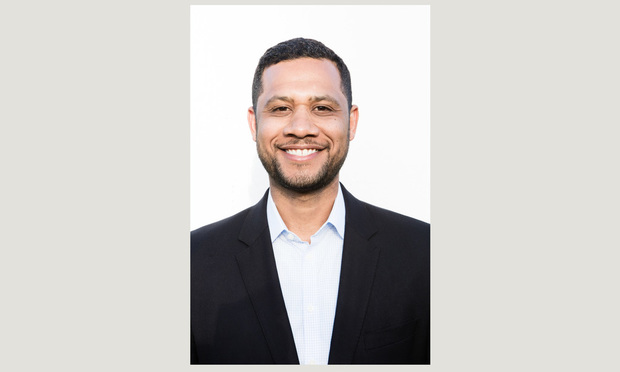The Key to Beating Burnout? Career Diversity
"While I don't have a one-size-fits-all solution for burnout, the key for me has been being willing to choose career diversity and purpose over predictability," writes Chris Young, the general counsel at venture-backed startup Ironclad.
October 21, 2019 at 12:48 PM
7 minute read
 Chris Young, general counsel of Ironclad Inc.
Chris Young, general counsel of Ironclad Inc.
Law school doesn't teach you to lose. From the moment you begin studying for the LSAT to the day you step off campus, you're comparing yourself to peers, thinking about your performance, and stressing over what's next.
That drive to succeed is natural, especially when you're working on things you find important. But succeeding isn't the only thing. The drive to succeed can blind you to career opportunities that may require temporary sacrifices or that may be less prestigious on the surface. Another risk of defining career success too narrowly is burnout—a condition that the World Health Organization recently recognized as an effect of chronic workplace stress. Burnout is a common concept, but most people don't realize that burnout can still happen when you're doing well in your career, not just when you're struggling.
In my own career, the experiences that I've found most meaningful have been the ones in which I've chosen hard or risky paths over predictable ones. While I don't have a one-size-fits-all solution for burnout, the key for me has been being willing to choose career diversity and purpose over predictability.
I've worked in Big Law and in politics, and I've been a litigator and in-house counsel. I consider myself lucky—I've loved every job I've had. That said, I've also learned that I've grown the most when I take opportunities that require comfort with uncertainty.
My advice for beating burnout? Be willing to bet on yourself, regardless of where you work and where you are in your legal career.
Putting purpose above predictability
In March 2007, I took a leave of absence from the law firm Morrison & Foerster to join the Obama campaign.
It was a difficult decision. At the time, the general consensus was that it was highly unlikely that Obama would become the president of the United States. Hillary Clinton was the favorite, and many experienced political operators had already joined her campaign.
I didn't care about the odds, though. I felt that Obama was a candidate who wanted to bring a divided country together, and I joined his campaign to help amplify his message because I thought it was healthy for the country. I joined the Obama campaign as the 40th hire; by the time I left, there were around 6,000 people in the organization.
That journey was an exciting one. It was one of the best experiences of my life. It brought truth and credibility to the notion that money doesn't mean everything. I felt a strong sense of purpose being one of many people throughout the country who were helping Barack Obama get elected.
It also showed me that, while nothing's guaranteed, going outside of a traditional legal career doesn't narrow your options moving forward.
Different jobs exercise different muscles
One of the well-kept secrets of the legal industry is how different lawyers' jobs can be. My day-to-day has been completely different as I've moved between legal roles, and each role has forced me to adopt a different mindset.
At a law firm, where you have access to seemingly endless administrative resources and where perfection is the goal, you learn to have exacting standards and to triple-check everything you work on. At Keker, Van Nest & Peters, I made sure everything I worked on was perfect.
Today, as a GC at a technology company, I tell my team not to let perfection be the enemy of the good. Our legal team is tasked with a number of responsibilities, and falling behind or slowing down the business is unacceptable. If we're confident that we've produced high-quality work, it doesn't make sense for us to spend too much additional time on it at the expense of other priorities.
The difference between Big Law and being in-house isn't necessarily how hard you work—jobs in either camp tend to be highly demanding—but how you think about setting goals and allocating resources.
Learning to make those judgments on my own has been one of the highlights of moving between positions in Big Law, politics and in-house.
Taking risks doesn't have to mean switching jobs
In a recent interview with law.com, I talked about how beneficial it can be to take a calculated risk in a legal career. Taking calculated risks can create room for professional growth and give you the chance to align your work with your long-term goals.
One thing I'd add to that interview is that you can take calculated risks without switching jobs. One skill that is useful for all professionals—but especially lawyers—is managing up and messaging career expectations clearly. While it may be true that career paths in law tend to be more rigid than they are in other professions, there are almost always ways to take what you're doing and tweak it in a way that helps you stay motivated and take on responsibilities that are outside of your comfort zone.
Jason Boehmig, Ironclad's CEO, used to work at Fenwick & West, and he learned to write computer scripts to automate routine legal tasks. That didn't just help him learn about technology—it also made him a more effective lawyer.
Now, as GC at Ironclad, I've found myself taking on a few projects that combine my legal background with my broader business experience. COOs like Dan Wright at AppDynamics and Belinda Johnson at Airbnb started as GCs, and I love the example they're setting when it comes to career growth and opportunity as a lawyer.
To me, managing up means aligning with your supervisor on how you can provide the most value to your company and looking for discrete projects you can work on that round out your professional profile. That's a skill that all lawyers can develop, regardless of where they work.
The legal industry is changing, for the better
Lawyers have been grappling with symptoms of professional burnout for decades. Research from 1990 found that, out of 100 occupations, lawyers had the highest rate of depression. Almost 30 years later, recent research has shown that many lawyers still grapple with anxiety and/or chronic stress.
So how do we make the legal career more sustainable?
My own experience has shown me that job fulfillment is not just about minimizing hours worked, but rather about taking calculated risks, learning new skills and finding creative ways to overcome challenges.
Encouraging career diversity and taking calculated risks won't eliminate burnout, but I've already seen the positive impact they can have on young lawyers today, and I'm excited to see more recent law school graduates and mid-career professionals bet on themselves moving forward.
Chris Young is general counsel at Ironclad Inc., the venture-backed startup that helps in-house lawyers create, automate and track their contracts—all from one intuitive, powerful platform. He draws on his years of experience as a corporate attorney and public servant to help shape and carry out the strategic vision of the company. As the company's chief counsel, he is responsible for a broad range of legal, regulatory and policy matters.
This content has been archived. It is available through our partners, LexisNexis® and Bloomberg Law.
To view this content, please continue to their sites.
Not a Lexis Subscriber?
Subscribe Now
Not a Bloomberg Law Subscriber?
Subscribe Now
NOT FOR REPRINT
© 2025 ALM Global, LLC, All Rights Reserved. Request academic re-use from www.copyright.com. All other uses, submit a request to [email protected]. For more information visit Asset & Logo Licensing.
You Might Like
View All
Build It and They Will Come: Tips to Market Your Practice as a Junior Attorney
6 minute read
Yelp Sues Google for Alleged Antitrust Violations, Citing Previous 'Watershed' Government Ruling

There's Something in the Water: San Diego Is Once Again a Hot Market for National Law Firms
6 minute read
What Happens When You Go Viral? How a Law Firm Associate Manages Her Social Media Success
5 minute readTrending Stories
Who Got The Work
J. Brugh Lower of Gibbons has entered an appearance for industrial equipment supplier Devco Corporation in a pending trademark infringement lawsuit. The suit, accusing the defendant of selling knock-off Graco products, was filed Dec. 18 in New Jersey District Court by Rivkin Radler on behalf of Graco Inc. and Graco Minnesota. The case, assigned to U.S. District Judge Zahid N. Quraishi, is 3:24-cv-11294, Graco Inc. et al v. Devco Corporation.
Who Got The Work
Rebecca Maller-Stein and Kent A. Yalowitz of Arnold & Porter Kaye Scholer have entered their appearances for Hanaco Venture Capital and its executives, Lior Prosor and David Frankel, in a pending securities lawsuit. The action, filed on Dec. 24 in New York Southern District Court by Zell, Aron & Co. on behalf of Goldeneye Advisors, accuses the defendants of negligently and fraudulently managing the plaintiff's $1 million investment. The case, assigned to U.S. District Judge Vernon S. Broderick, is 1:24-cv-09918, Goldeneye Advisors, LLC v. Hanaco Venture Capital, Ltd. et al.
Who Got The Work
Attorneys from A&O Shearman has stepped in as defense counsel for Toronto-Dominion Bank and other defendants in a pending securities class action. The suit, filed Dec. 11 in New York Southern District Court by Bleichmar Fonti & Auld, accuses the defendants of concealing the bank's 'pervasive' deficiencies in regards to its compliance with the Bank Secrecy Act and the quality of its anti-money laundering controls. The case, assigned to U.S. District Judge Arun Subramanian, is 1:24-cv-09445, Gonzalez v. The Toronto-Dominion Bank et al.
Who Got The Work
Crown Castle International, a Pennsylvania company providing shared communications infrastructure, has turned to Luke D. Wolf of Gordon Rees Scully Mansukhani to fend off a pending breach-of-contract lawsuit. The court action, filed Nov. 25 in Michigan Eastern District Court by Hooper Hathaway PC on behalf of The Town Residences LLC, accuses Crown Castle of failing to transfer approximately $30,000 in utility payments from T-Mobile in breach of a roof-top lease and assignment agreement. The case, assigned to U.S. District Judge Susan K. Declercq, is 2:24-cv-13131, The Town Residences LLC v. T-Mobile US, Inc. et al.
Who Got The Work
Wilfred P. Coronato and Daniel M. Schwartz of McCarter & English have stepped in as defense counsel to Electrolux Home Products Inc. in a pending product liability lawsuit. The court action, filed Nov. 26 in New York Eastern District Court by Poulos Lopiccolo PC and Nagel Rice LLP on behalf of David Stern, alleges that the defendant's refrigerators’ drawers and shelving repeatedly break and fall apart within months after purchase. The case, assigned to U.S. District Judge Joan M. Azrack, is 2:24-cv-08204, Stern v. Electrolux Home Products, Inc.
Featured Firms
Law Offices of Gary Martin Hays & Associates, P.C.
(470) 294-1674
Law Offices of Mark E. Salomone
(857) 444-6468
Smith & Hassler
(713) 739-1250






